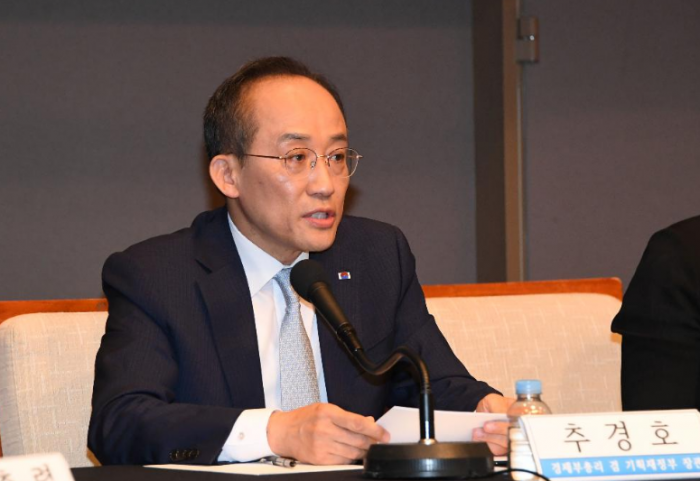Foreign exchange
S.Korea to discuss bilateral currency swap with Japan
Seoul’s finance minister says government may cut economic growth forecast but rules out support measures such as extra budget
By Jun 09, 2023 (Gmt+09:00)
2
Min read
Most Read
LG Chem to sell water filter business to Glenwood PE for $692 million


KT&G eyes overseas M&A after rejecting activist fund's offer


Mirae Asset to be named Korea Post’s core real estate fund operator


StockX in merger talks with Naver’s online reseller Kream


Meritz backs half of ex-manager’s $210 mn hedge fund



South Korea plans to discuss with Japan the re-establishment of their bilateral currency swap line, said its finance minister on Thursday, as the diplomatic relations between the two countries improved.
Seoul’s Finance Minister Choo Kyung-ho and his Japanese counterpart Shunichi Suzuki are scheduled to meet in Tokyo on June 29-30 to discuss the current economic situation, as well as possible economic and financial cooperation.
“The currency swap deal between South Korea and Japan expired in 2015, and I will discuss the matter,” Choo said in a meeting organized by an association of senior local journalists. “I will do my best to draw significant results.”
South Korea’s finance ministry was understood to seek the arrangement, which serves as a backstop against any potential currency crisis, as a symbol of the bilateral financial cooperation although it does not believe the country immediately needs such a facility.
Talks over a new swap accord were suspended in January 2017 when their relations soured on historical and territorial issues including those over South Korean victims of forced labor during Japan’s colonial rule of the Korean Peninsula from 1910 to 1945.
Their relations, however, improved after South Korean President Yoon Suk Yeol in March offered to resolve the forced labor issue by compensating Seoul’s own without asking for contributions from Japan.
MAY CUT GROWTH FORECAST
Choo said the government is likely to slash its economic growth forecast for 2023 although Asia’s fourth-largest economy is expected to rebound in the second half.
“We may have to slightly lower the current forecast of 1.6%,” he said. “We will announce a new growth forecast at the end of June or early July.”
The Bank of Korea cut its growth forecast for this year to 1.4% from the previous 1.6% last month when the central bank left its policy interest rate steady at 3.50%.
Choo, however, maintained the government’s earlier expectations of an economic recovery in the coming months.
“The trade account is likely to turn to the black in the second half, especially in the fourth quarter,” he said. “Energy prices are falling, while the semiconductor sector is predicted to revive after the third or fourth quarter.”
South Korea extended its trade deficit spree to a 15th straight month in May as exports fell for the eighth consecutive month on sluggish overseas sales of semiconductors, the country’s top export item. The nation is home to the world’s two largest memory chipmakers – Samsung Electronics Co. and SK Hynix Inc.
The government has yet to consider any measures such as a supplementary budget to support the economy, Choo said.
“Such steps could boost worries about inflation, which started showing signs of stabilization,” Choo said. “We need to strengthen our stance on price stability for the time being.”
Headline inflation fell for a fourth straight month in May to a 19-month low.
Write to Sang-Yong Park at yourpencil@hankyung.com
Jongwoo Cheon edited this article.
More to Read
-
 Central bankBOK leaves door open for another quarter-point rate rise
Central bankBOK leaves door open for another quarter-point rate riseMay 25, 2023 (Gmt+09:00)
2 Min read -

-
 EconomyKorea inflation at 19-mth low; casts doubts over rate hike
EconomyKorea inflation at 19-mth low; casts doubts over rate hikeJun 02, 2023 (Gmt+09:00)
2 Min read -

Comment 0
LOG IN


